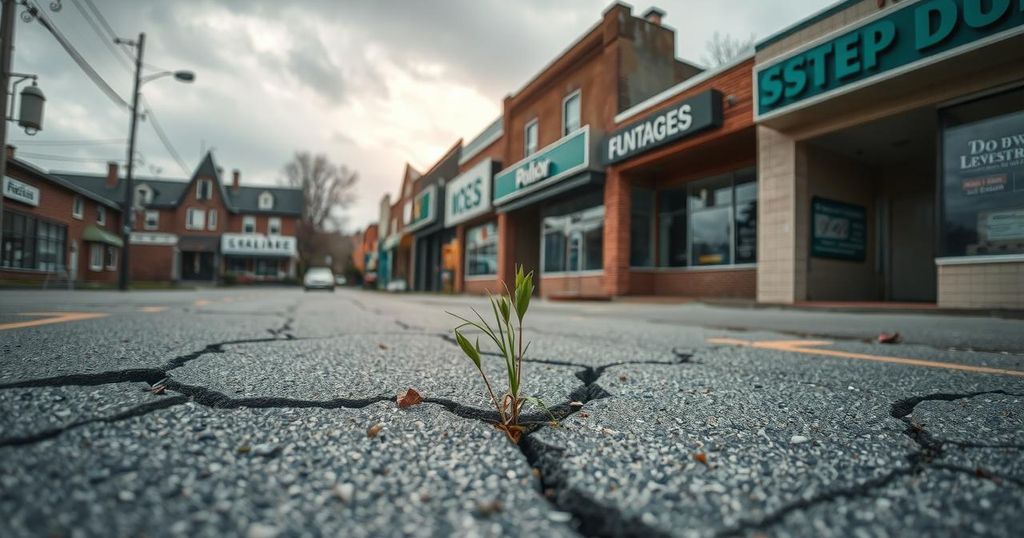Iran’s economy is suffering due to Trump’s reinstated sanctions, with the rial hitting an all-time low and inflation soaring. Citizens have lost faith in the government, hoarding $70 billion in assets outside the economy. Political leaders debate whether to negotiate with the U.S. or escalate nuclear efforts as economic pressures intensify.
The Iranian economy is facing significant challenges as U.S. President Donald Trump’s reinstatement of a “maximum pressure” sanction policy has severely impacted local markets. The Iranian rial has plummeted to a record low against the dollar on the black market, currently trading at 858,000 rials per dollar, reflecting a staggering loss of value. The demand for U.S. dollars has surged as citizens perceive them as a secure asset, resulting in a 25% depreciation of the rial since Trump’s re-election.
The rial’s decline has continued, losing an additional 5.5% since Trump assumed office again. Over the past year, ongoing geopolitical tensions, including direct confrontations with Israel, have culminated in a 55% drop in the currency’s value. This dramatic currency collapse has exacerbated inflation rates; while the government claims an inflation rate of 40%, independent economists warn that it is likely much higher, given the consistent rise in prices for food and essentials.
Public frustration is intensifying as the rapid depreciation of the rial depletes the purchasing power of many Iranians, affecting even middle-class citizens. Growing discontent is directed towards the government due to perceived economic mismanagement, widespread corruption, and misplaced priorities. Many citizens have shifted to protecting their assets outside official economic channels to safeguard against financial instability.
According to Gholamreza Mesbahi-Moghaddam, a member of Iran’s Expediency Discernment Council, Iranians have accumulated approximately $70 billion in gold and foreign reserves outside of the economy. He remarked, “The state is seeking $5 billion in loans from international bodies, while $70 billion remains outside the economic system in private hands.” This situation reflects a critical lack of confidence in state institutions, particularly in banking.
Tehran’s leadership is at a crossroads in determining its response to U.S. sanctions. Officials close to President Masoud Pezeshkian advocate for negotiations with the United States to mitigate the adverse economic impacts, stressing that an agreement and sanctions relief are vital for revitalizing the economy. Conversely, the ultra-conservative ruling faction views the increased U.S. pressure as rationale for advancing Iran’s nuclear program as a defense mechanism. Ultimately, the decision rests with Supreme Leader Ali Khamenei.
The article focuses on the current economic crisis in Iran resulting from U.S. sanctions reinstated by President Trump. It highlights the drastic depreciation of the national currency, the rial, and the resulting inflationary pressures. The piece outlines the public’s diminishing trust in the government and financial institutions, as many citizens resort to hoarding foreign currency and gold. Furthermore, it sheds light on the internal political divisions regarding how best to respond to U.S. policies, illustrating the tension among Iranian leadership about negotiations versus aggressive nuclear development. These ongoing economic issues underscore the larger impact of geopolitical affairs on the Iranian populace and their economy, illustrating how international relations significantly affect domestic stability and public sentiment. The mounting pressure from both the U.S. sanctions and internal economic strife presents critical challenges for Iran’s socio-political fabric.
In summary, Trump’s renewed sanctions have profoundly destabilized Iran’s economy, leading to a significant devaluation of the rial and sustained inflation. The public’s growing distrust in governmental authority has resulted in a substantial hoarding of wealth outside the formal economy. As political factions within Iran grapple with the decision to either negotiate or accelerate nuclear development, the situation remains precarious, with far-reaching implications for both the Iranian people and broader geopolitical dynamics.
Original Source: www.ynetnews.com






